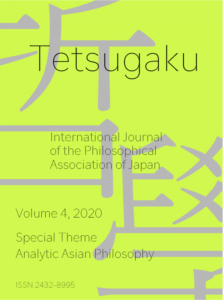
Chen Hsun-Mei (co-author, with Wang Wen-Fang)
Tetsugaku, vol. 4 (2020)
Abstract: The famous Madhyamaka philosopher Nāgārjuna has a very special way of arguing against his opponent: he often argues and concludes that a certain thesis of his opponent should be rejected while at the same time denies that he has therefore endorsed the negation of the thesis of his opponent. This special way of argumentation had a tremendous influence upon later Indian Buddhist philosophers but has invoked two different interpretations, the Prāsaṅgika and the Svātantrika, about what exactly this special way of arguments is. While Svātantrika proposes that one should establish full hetuvidya syllogisms in accord with the ultimate truth to rebut opponents, Prāsaṅgika proposes that the only legitimate Madhyamaka way of argumentation is to deny opponents’ theses by merely indicating their absurdities. Strikingly, both Svātantrika and Prāsaṅgika emphasize that the negation used in the Madhyamaka arguments should be prasajyapratiṣedha. In this paper, the authors explore how Bhāviveka and Candrakīrti, two representors of Svātantrika and Prāsaṅgika respectively, had different understandings of prasajyapratiṣedha. Based on textual evidences and philosophical analysis, the authors argue that while Bhāvivek’s way of using prasajyapratiṣedha in a Svātantrika argument would commit him to a certain conclusion, Candrakīrti’s way of using prasajyapratiṣedha in a Prāsaṅgika argument would not have the same effect.
From a rational reconstruction, the authors then propose that a Mādhyamika, one who advocates Madhyamaka ideas, should simply reject his opponent’s thesis by drawing absurdity from it and should at the same time refrain from making any conclusion, and therefore the Prāsaṅgika interpretation is the right Nāgārjuna way of argumentation as shown in Mūlamadhyamakakārikā. In the end, based on Prāsaṅgika way of argumentation, the authors will provide a formal regimentation of Nāgārjuna’s rebuttal.
About the author: Chen Hsun-Mei was a HYI Buddhism and Ethnicity Training Program Visiting Fellow from 2019-20.
